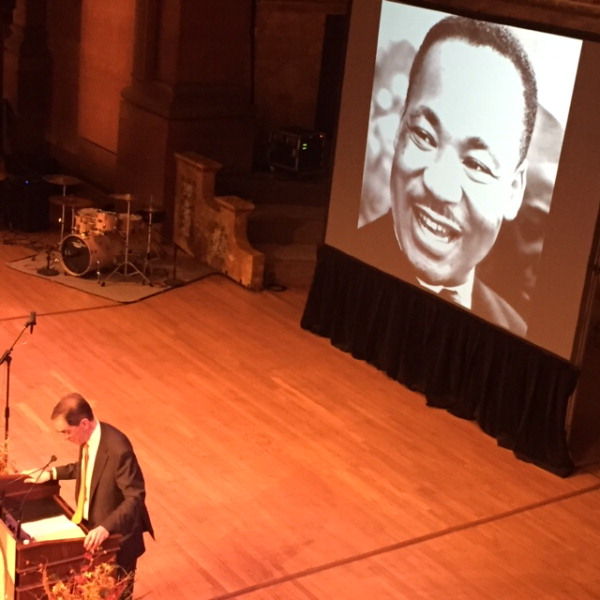By Philip Sean Curran, Staff Writer
Princeton University President Christopher L. Eisgruber said Monday on Martin Luther King Jr. day that college students nationally are “rightly outraged” at racial injustice that led them to protest at Princeton and other college campuses last year.
At the school’s annual celebration of Mr. King, Mr. Eisgruber spoke from the stage in Richardson Auditorium where a large image of the slain civil rights leader served as his backdrop. In remarks lasting nearly 11 minutes, Mr. Eisgruber said the nation and its colleges and universities have made progress in race relations, but he felt more work needed to be done.
“Despite all the progress that America has made, the struggle for genuine equality remains both incomplete and urgent. I believe that the struggle for genuine equality is at the core of the protests that have taken place at Yale, at Princeton and on other college campuses over the past year,” he said on the two-month anniversary of the black-student-led movement to occupy Nassau Hall.
In November, Princeton students called for the removal of former university president and U.S. President Woodrow Wilson’s name from Princeton’s public policy school, among other demands. In response, the school is reexamining the legacy of Mr. Wilson, who supported racial segregation.
Mr. Eisgruber did not mention Mr. Wilson by name. But in a speech after he spoke, keynote speaker Wesley L. Harris, a Princeton alumnus and professor at the Massachusetts Institute of Technology, suggested renaming the public policy school after former university president Bill Bowen and former economics professor W. Arthur Lewis, who was black.
The protests at Princeton, lasting parts of two days the week before Thanksgiving, were part of larger trend nationwide. Mr. Eisgruber said the student activism nationally has its roots in the Black Lives Matter movement, one that began after George Zimmerman was found not guilty in 2013 of killing Trayvon Martin.
Mr. Eisgruber cited the “multiple” cases in the past 18 months of police using lethal force against blacks, “without adequate justification.” In particular, he touched on the death of Laquan McDonald, shot multiple times in October 2014 by a Chicago police officer now charged with his murder. The police dash camera video of the shooting, “like the pictures of Bull Connor and his dogs in the 1960s, is horrifying,” Mr. Eisgruber said.
“Our students are rightly outraged. The nation should be outraged,” he said.
Later he said he took “inspiration from the idealism of our students.”
But the protests at Princeton, however, sparked a counter-movement on campus — one that Mr. Eisgruber did not address in his remarks on Monday. Other Princeton students pushed back at the tactics of their peers, and said Mr. Wilson’s name should not be scrubbed from memory.
“We should care about making our college campuses more inclusive and more fully committed to real mutual understanding and respect. But even more fundamentally, we should care about making this true for the country,” Mr. Eisgruber said.
Pivoting his remarks, Mr. Eisgruber touched on the “other America.”
“We should care, as Dr. King urged us to do, about what he called the other America, about the America where people are not so fortunate as we are on this campus, about the America where people struggle to find decent jobs, to get healthcare, to educate their children, to be treated fairly and to live without fear,” he said.
He urged his audience to honor Mr. King by “rededicating ourselves to the struggle for genuine equality and to the struggle on behalf of the other America.”
Mr. King, who visited the Princeton campus twice in the early 1960s, had demonstrated for the country “the power and the virtue of peaceful demonstration,” Mr. Eisgruber said.
“We remember and celebrate Dr. Martin Luther King for his commitment to equality, to justice, to humanity and to social change,” he said. “We remember him also for his devotion to nonviolent protest. Dr. King insisted that we must strive for purity not only in our ends but also in the means that we choose to achieve them.”

